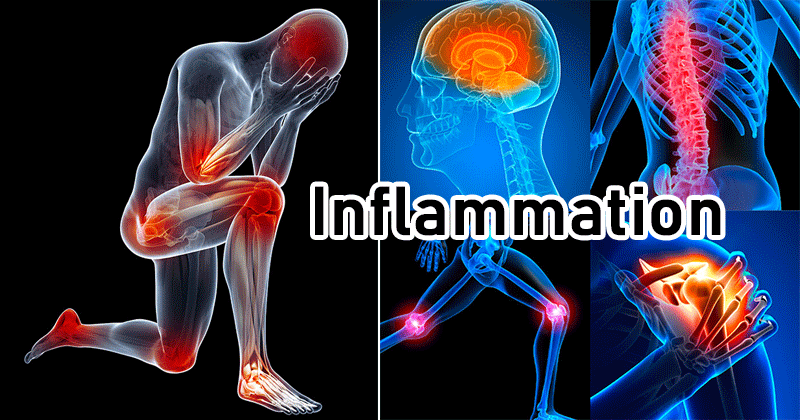Inflammation, a natural response to injury or infection, is a double-edged sword. While it's essential for healing, excessive or chronic inflammation can wreak havoc on your body. In this post, I’ll delve into its intricacies, exploring causes, symptoms, and how to dampen it when it appears excessively.
Given the widespread factors that can contribute to inflammation, (think: unhealthy foods, toxins in the air, medicines or even excess stress), it's important to understand its complexities. When this condition becomes chronic and uncontrolled, it can damage tissues and ultimately be responsible for many chronic illnesses, such as heart disease and diabetes. So it's important to build some buffers into your daily life.
What Is Chronic Inflammation?
When chronic inflammation persists over time, it causes damage to healthy cells and organs. This might surprise you, but the far-reaching implications are linked to a variety of health problems, from cardiovascular diseases to neurodegenerative disorders such as Alzheimer's and dementia.
Be aware of cues your body gives, such as persistent fatigue, joint pain, bloating or irritable bowel syndrome, skin issues, and frequent infections. The immune system regulates inflammation and releases inflammatory cytokines to combat perceived threats. When these cytokine levels remain elevated due to ongoing stressors—such as poor diet, physical inactivity, or toxic exposure—the immune system becomes compromised and inflammation can develop.
You’ll also want to avoid many of the over 80,000 chemicals we’re exposed to daily that haven’t been tested for human safety. They’re everywhere: in furniture as fire retardants, cosmetics as heavy metals, household cleaners as emulsifiers, and in our food as preservatives, creating all sorts of health problems.
Diet: A Powerful Tool

Taming chronic inflammation starts with what you put on your fork. Your best defence starts with healthy foods. Researchers find that a pro-inflammatory diet of grain-fed meats, sugary beverages, refined carbs, vegetable oils, and pretty much any processed food in your grocery store are sure triggers.
According to Harvard Health, an anti-inflammatory diet can improve overall health. Foods rich in fruits, vegetables, nuts, fatty fish like salmon and sardines, and healthy fats—such as olive oil and avocados—should be prioritized.
Staying hydrated is also essential. Carry a water bottle wherever you go, infused with a pinch of mineral salt to enhance hydration.
Feed Your Microbiome
A 2020 study in the British Journal of Nutrition, explains that dietary nutrition greatly dampens overall inflammation by supporting a healthy microbiome of diverse, beneficial bacteria.
To support good gut health, focus on eating both probiotics and prebiotics to support the microbiome. Prebiotics can be found in:
Alliums (leeks, garlic and onions)
Fruits like apples, bananas and berries
Ground flaxseeds
Honey
Green veggies
Whole grains such as oats, whole wheat and barley
Exercise and Stress Management

Research shows that regular exercise protects against chronic low-grade systemic inflammation, with experts recommending at least 150 minutes of moderate-intensity activity weekly, such as brisk walking or cycling. Strength training also is a huge help.
Stress is another trigger. A 2012 article in the Proceedings of the National Academy of Sciences explains that in this state, your body can remain constantly inflamed because it thinks it's in danger. Management techniques like meditation and downtime are quite helpful, as is quality sleep. Forty percent of Americans get less than seven hours of recommended sleep per night, and this can trigger or exacerbate inflammation.
If you have trouble with this issue, you can create a restful sanctuary with comfortable bedding, blackout curtains, a cool room, and unplugging electronic devices to minimize distractions.
Biohacking Techniques
Cold exposure therapy, such as cold showers, is a simple yet effective method for reducing inflammation. Just 30 seconds to 3 minutes of cold exposure at the end of your shower can yield mood-elevating and anti-inflammatory benefits.
Additionally, red light therapy modulates the immune system and decreases the production of inflammatory markers. It also increases blood flow to deliver increased oxygen and nutrients to damaged tissues, reducing pain.
Supplementing Your Health
Omega-3 fatty acids found in fish oil are known for their potent anti-inflammatory properties, while Turmeric, with its active compound curcumin, has been shown to be as effective as some anti-inflammatory drugs.
Start your day with an all-in-one alkaline and anti-inflammatory smoothie containing berries, spinach, chia seeds, omega-3 oil and a splash of turmeric.
The Bottom Line
Basically a healthy lifestyle helps fight chronic inflammation. Be patient during the process. Not much might happen initially, but then 2-3 months in, you'll experience a sudden improvement in symptoms.
Continue to stick with the plan even after feeling better because any processed foods and sugary drinks promote inflammation. Go all in treating your body with care and respect. The more healthy habits you practice, with consistency, the better chance you'll have at overcoming the issue.
Your presence here is greatly valued, and that’s why we make all our reading material free on this site. But if you've found the content interesting and useful, please consider supporting it through a very cost-effective paid subscription. This plays a vital role in covering operational costs and supports the continuation of this independent, unbiased research and journalism work. Thank you!!
If shy about commitments, feel free to leave a one-time tip!








